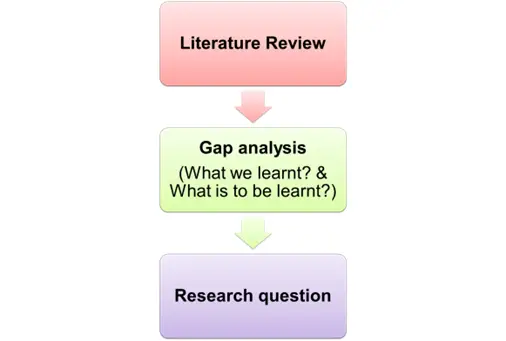Formulation of the research questions is an important task before starting any research work. The main objective of framing the research question is to understand the existing research gaps in any field of research and to identify the need for extensive investigation. Therefore, it is significant to formulate good research questions.
The very first step in developing a research question is to identify the area of research and then carry out the preliminary study. The researcher needs to do an extensive literature survey to identify gaps in existing research, and based on this gap, research questions can be framed and investigated. Moreover, formulation of a research question is a systematic process and has to be done meticulously as these questions have more impact on the successful completion of your novel research.
Therefore, in this article, iLovePhD discussed how to frame a research question that is specific enough to explore the paths related to your research.

Characteristics of the ideal Research Question
A good research question:
- Elaborates the problem statement
- Describes the problem under investigation
- Improves focus on the problem statement
- Guides data collection and analysis
- Enhances the importance of research.
Ratan et al., 2019 listed ten characteristics of a good research question which is presented below. It is expressed by the acronym ‘FINERMAPS’.
| Feasible (F) | The ability of the researcher to carry out research within the limited time and resources available. Sometimes, the research question appears feasible, but when the study gets started, it proves otherwise. Therefore, it is important to be realistic about the scope and scale of the project. |
| Interesting (I) | This aspect is indispensable in that researchers should have a real interest in their research and this will motivate researchers to complete research work successfully. |
| Novel (N) | Research questions should be novel, and innovative, and should have scope to be investigated. Questions should be simple and clear and thought-through Having one key question with several sub-questions will enhance your research. |
| Ethical (E) | A most important requirement of any research question. The researcher should get appropriate clearance from authorities before starting the fieldwork. It also helps in avoiding deceptive practices in research |
| Relevant (R) | The research question should be of academic and intellectual interest to readers in your field of research. It should develop a clear and relevant purpose for the research in connection with your research. Research questions should fill gaps in knowledge, analyze the assumptions or practices, and compare different concepts, methods, and theories within the study area. |
| Manageable (M) | Research questions framed for the research work should be well-managed by the researchers. |
| Appropriate (A) | The research question should be appropriate logical and scientific. |
| The potential value and Publishability (P) | A research study should make a significant impact on socioeconomic and health practices. A good research question should address important implications for taking critical decisions in the health and healthcare sectors. |
| Systematic (S) | Research is structured with a methodology to be followed in a sequence in accordance with a well-defined set of rules without compromising creative thinking. |
“Successful and novel research topics are carefully defined and focused but are parts of a broad-ranging, complex problem.”
ilovephd.com
How to Formulate the Research Question (Step-by-Step Procedure)
Before framing a research question, the researcher needs to have a broad and deep understanding of the field of research. The formulation of the research question is the result of extensive reading, thinking, and discussing the ideas with the supervisor. It is an iterative process, so, the research question gets revised periodically.
Step 1: Start by identifying a wider area of research for investigation (For example Wastewater treatment)
Step 2: Do a gap analysis on that topic to understand the existing research works and what is to be investigated further. (Example: Novel technique for the treatment of wastewater).
Step 3: What is to be understood still? (Example: Advantages and limitations of other existing wastewater treatment technologies).
Step 4: What are the implied questions? (Example: How this novel technique is unique from other technologies with respect to efficiency and cost).
Step 5: Narrow down the scope and focus of research (Example: A pilot-scale study on the treatment of wastewater by a novel technique for reuse).
Once the research question is framed, the researcher should evaluate it. This is done to understand whether the questions framed are meaningful or need further revision. Helen Kara, 2015 presented the technical requirements to assess the research question as follows:
- Is the research question clear and specific?
- Is the research question simple or complex?
- Is the research question researchable?
- Is the research question relevant?
- Is the research question have social importance?
- Is the research question narrow or broad?
- Is the research question measurable?

Examples of Good Research Questions:
The following questions fulfill the criteria of good research questions, that is, feasible, novel, interesting, ethical, relevant, and social importance.
- What are the novel, safe, and cost-effective methods to transport hydrogen gas to use it as fuel?
- What are the sustainable ways of producing green hydrogen?
- What are the novel methods to treat emerging contaminants in wastewater?
- How to mitigate active security attacks in the Internet of Medical Things?
- What are the economical methods to recycle used batteries?
- How to minimize the impact of macroeconomic conditions such as inflation on essential goods and services?
- What kind of framework is needed to dynamically update the existing university syllabus in-line with emerging technologies?
- How to design and develop pollution-free vehicles to minimize air pollution?
We hope, this article helped you to learn how to formulate your research questions based on the knowledge gained from the literature review. A good research question requires complete gap analysis and deep insight into the problem to be studied. Research work carried out by such questions can have a good impact in the field of social and health sectors for taking policy decisions for the benefit of our society.
Also Read: Top 38 Possible PhD Viva Questions



